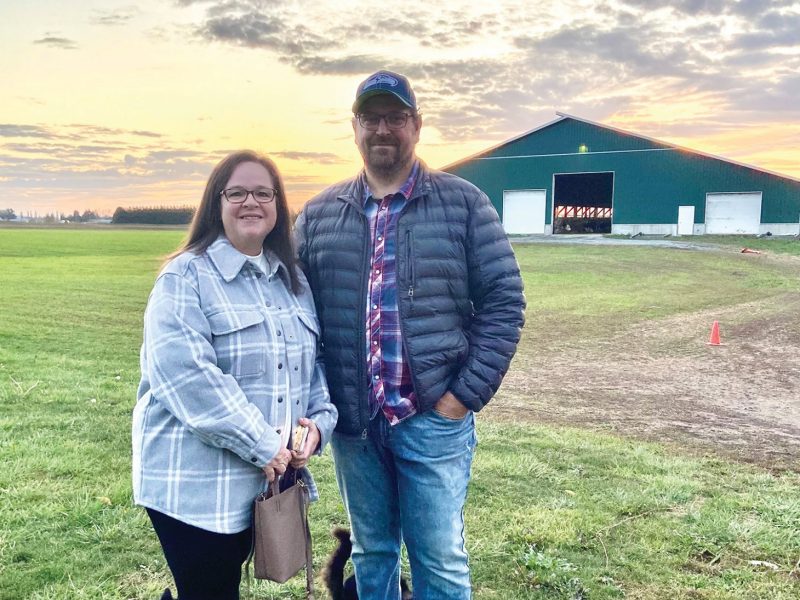ABBOTSFORD – When it comes to mental wellness, the fierce independence and stoicism too common in farmers can be problematic.
“I heard from a poultry producer yesterday,” says Wendy Bennett, executive director of AgSafe BC. “She said, ‘My husband needs the support, but he won’t ask for it. So, when I call, and it’s peer group support, I hand him the phone and he’ll stay on it. It’s really helpful for him but he won’t make the call.’”
AgSafe offered three webinars in December encouraging discussion about resilience and mental wellness. There’s good reason for concern. The past year has seen BC producers face excessive heat, drought, fires, flooding, supply chain disruptions and more recently avian influenza, inflation and rising interest rates.
To respond to mental wellness calls from farmers, ranchers and their workers, AgSafe partners with a team of 14 counsellors able to respond in English, Spanish and Punjabi.
“We saw use increase slightly in the last month with the anniversary of the flood. It isn’t good there’s more need for support, but it is good because we know they are accessing it,” says Bennett, who gauges demand by each month’s counselling charges (calls are neither recorded nor tracked).
AgSafe’s program will be joined in fall 2023 by a nationwide 988 mental health hotline that mirrors one launched in the US in July 2022.
Bennett also hopes research University of Guelph conducted in 2021 will help AgSafe better target commodity groups at greater risk of stress. But even Bennett knows more open discussion is required around mental wellness.
It’s partly why she and Jimi Meier, a dairy farm wife from Abottsford, spoke about the BC flood experience and its impact on producers at Farm Management Canada’s Agricultural Excellence Conference in Canmore in November.
Meier and Hallie Jacobs, another farm wife, spearheaded an initiative to help to others during the November 2021 flooding in the Fraser Valley. It turned into a larger community-building movement that continues today.
“It just kept going. Someone called yesterday looking for a load of wood because they don’t have a furnace yet. It went on our Helping Sumas Prairie Farmers–Flood Support Facebook page and within 10 minutes, somebody messaged, and we got wood,” she says.
Although Meier knows it isn’t direct mental wellness support or enough to be a major change in someone’s life, she has direct experience with producers’ thinking.
“Ninety-nine percent of them will say, “Oh, no, please give it to somebody else. There’s somebody worse off than us.’ But you know, there are plenty of people I’m talking to where they don’t think there’s anybody worse off,” Meier says.
With help from donors, Meier and Jacobs collected and distributed about $106,000 in cash and gift cards as well as about $55,000 worth of items over the past year.
“Our initial goal was just to bring a bit of cheer,” Meier explains. “During the flooding, we drove around handing out gloves. Later someone said, ‘It was one of the best days because, even though it was just gloves, we knew that people knew what was happening and cared.’”
Normally an anxious person, Meier was reassured during 2021’s flooding because her husband kept saying they’d be okay given that their farm occupied higher ground. But when they received a notice of “imminent danger” in what could be “a catastrophic situation with potential loss of life,” she, five employees, her mother-in-law and her daughters relocated to family and friends. Her husband, sons and her daughter’s boyfriend stayed at the farm to care for the cows.
“My 14-year-old got very emotional about her 17-year-old brother, pleading, ‘Mom, he’s so young. He can’t stay.’ She was thinking about losing him,” says Meier. “Different people handle stress differently.”
Bennett says now is the time to address issues of stress in agriculture to try and prevent the worst.
“Our current WorkSafe regulations are literally there because someone died,” says Bennett. “If we don’t address mental health in agriculture, it’s going to get a whole lot worse before it gets any better. If we can help to spread the word about mental health, maybe we can make it so somebody doesn’t die.”


 Farmgate abattoirs shut out of insurance
Farmgate abattoirs shut out of insurance